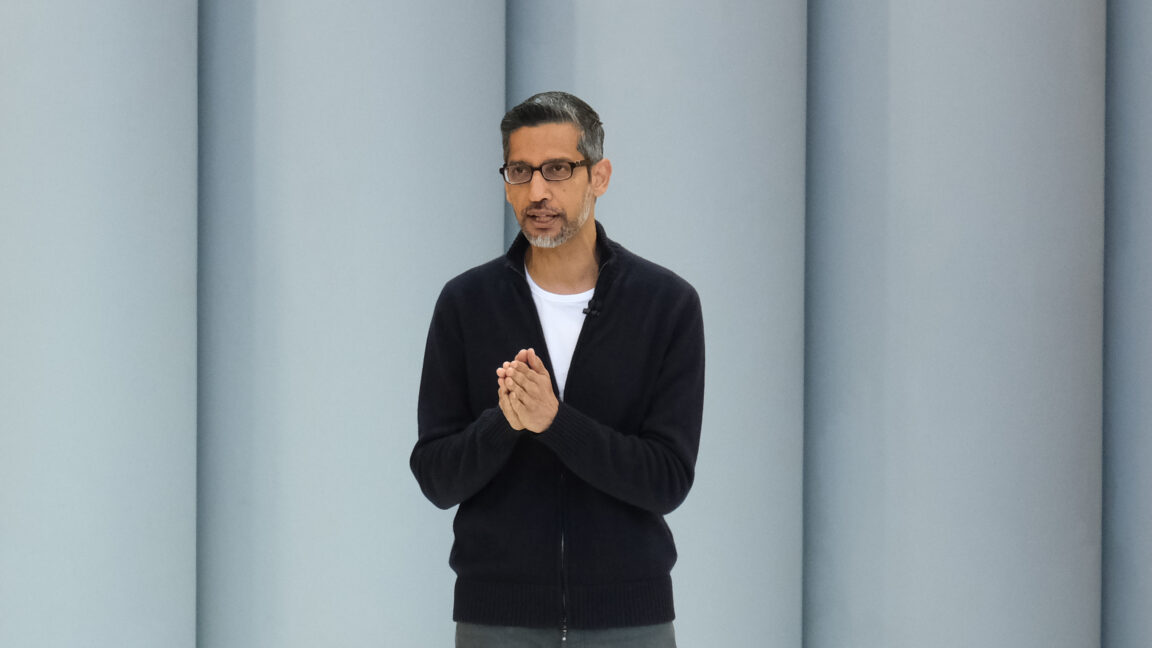
Credit: Ryan Whitwam
On Tuesday, Alphabet CEO Sundar Pichai warned of “irrationality” in the AI market, telling the BBC in an interview, “I think no company is going to be immune, including us.” His comments arrive as scrutiny over the state of the AI market has reached new heights, with Alphabet shares doubling in value over seven months to reach a $3.5 trillion market capitalization.
Speaking exclusively to the BBC at Google’s California headquarters, Pichai acknowledged that while AI investment growth is at an “extraordinary moment,” the industry can “overshoot” in investment cycles, as we’re seeing now. He drew comparisons to the late 1990s Internet boom, which saw early Internet company valuations surge before collapsing in 2000, leading to bankruptcies and job losses.
“We can look back at the Internet right now. There was clearly a lot of excess investment, but none of us would question whether the Internet was profound,” Pichai said. “I expect AI to be the same. So I think it’s both rational and there are elements of irrationality through a moment like this.”
Over the past year, some analysts and tech industry critics have expressed increasing skepticism about a web of $1.4 trillion in deals surrounding Google competitor OpenAI in particular. The company has committed to spending $1.4 trillion on infrastructure over eight years, while it expects to generate around $13 billion in revenue this year. OpenAI CEO Sam Altman told reporters at a private dinner in August that investors are “overexcited” about AI models and that “someone” will lose a “phenomenal amount of money.”
Reacting to the Pichai comments, prominent AI industry critic Ed Zitron told Ars Technica, “I think that this is the first moment where a magnificent 7 feels it’s necessary to be on the right side of history, leaning on the shaky talking point of ‘there was a lot of over investment in the Internet too’ because there really isn’t a defense for the—to use his own terminology—‘excess investment’ in AI.” He added, “I imagine others will follow.”
Market concerns and Google’s position
Alphabet’s recent market performance has been driven by investor confidence in the company’s ability to compete with OpenAI’s ChatGPT, as well as its development of specialized chips for AI that can compete with Nvidia’s. Nvidia recently reached a world-first $5 trillion valuation due to making GPUs that can accelerate the matrix math at the heart of AI computations.
Despite acknowledging that no company would be immune to a potential AI bubble burst, Pichai argued that Google’s unique position gives it an advantage. He told the BBC that the company owns what he called a “full stack” of technologies, from chips to YouTube data to models and frontier science research. This integrated approach, he suggested, would help the company weather any market turbulence better than competitors.
Pichai also told the BBC that people should not “blindly trust” everything AI tools output. The company currently faces repeated accuracy concerns about some of its AI models. Pichai said that while AI tools are helpful “if you want to creatively write something,” people “have to learn to use these tools for what they’re good at and not blindly trust everything they say.”
In the BBC interview, the Google boss also addressed the “immense” energy needs of AI, acknowledging that the intensive energy requirements of expanding AI ventures have caused slippage on Alphabet’s climate targets. However, Pichai insisted that the company still wants to achieve net zero by 2030 through investments in new energy technologies. “The rate at which we were hoping to make progress will be impacted,” Pichai said, warning that constraining an economy based on energy “will have consequences.”
Even with the warnings about a potential AI bubble, Pichai did not miss his chance to promote the technology, albeit with a hint of danger regarding its widespread impact. Pichai described AI as “the most profound technology” humankind has worked on.
“We will have to work through societal disruptions,” he said, adding that the technology would “create new opportunities” and “evolve and transition certain jobs.” He said people who adapt to AI tools “will do better” in their professions, whatever field they work in.

-
 C114 Communication Network
C114 Communication Network -
 Communication Home
Communication Home


